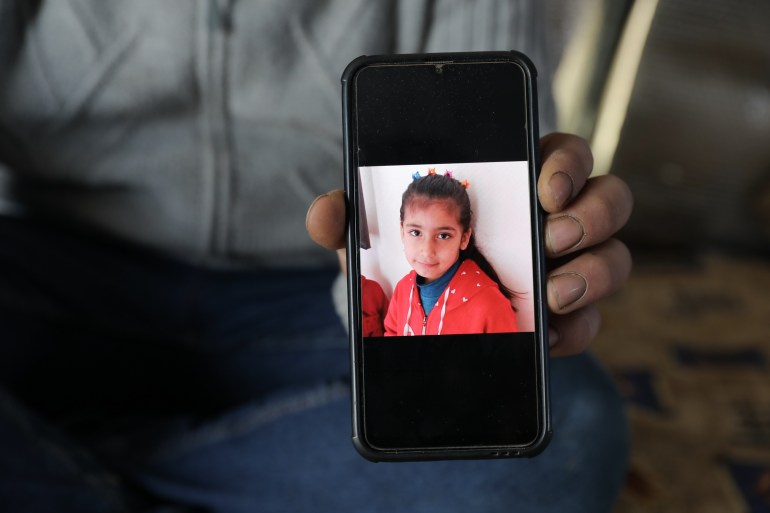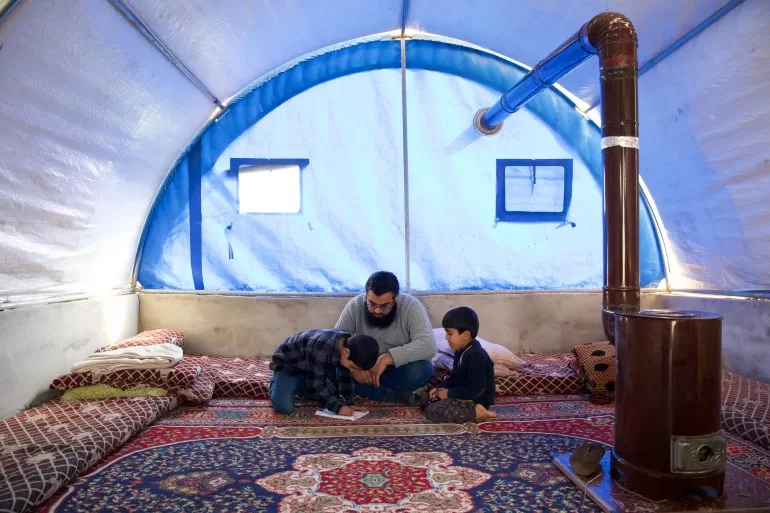“We were 15 people and only six of us survived,” Ibrahim still remembers the first seconds of the magnitude 7.8 earthquake that struck – followed by a second, nearly as strong – southern Turkey and northwestern Syria at 4:17am on February 6, 2023.
He was woken up by the sound of his mother shouting from downstairs, telling him to leave the house. Confused, he felt around trying to find his thick glasses so he could see his way.
That delay was the reason he survived. He was unable to cross the threshold of his room before the house collapsed on everyone inside it.
“I lost my father, my mother, two of my brothers, my sister, her three children, and my daughter Ghazal,” Ibrahim told Al Jazeera.
He nearly lost his youngest son Hussein, too, he says, until the family dog Tiki helped rescue him four days after the quake.

The empty grave
Ibrahim was the first to be pulled out of under the rubble by villagers who had gathered to rescue whoever they could while connections were out and rescue and ambulance teams had not arrived yet.
The extent of the destruction the earthquake caused to the roads across the region meant that civil defence teams had a hard time reaching remote villages.
Added to that was the failure of rescue aid to enter the northwest in the first days of the earthquake, leaving villagers alone and responsible for searching and rescuing and transporting the dead, wounded and injured.
Ibrahim, who is in his 30s, was wounded in his feet and head but remained standing, trying to move the heavy stones off his family along with the rescuers.
He reached his son and wife, then found his seven-year-old daughter, Ghazal, dead.
The villagers kept working to find everyone who was under the rubble, and after a long day, nine new graves were dug in the cemetery next to the house. Eight of them were filled and the last lay empty.
“I prepared that grave for my father, Hussein, and for my son, whom I named after him and whom he loved very much,” Ibrahim said.
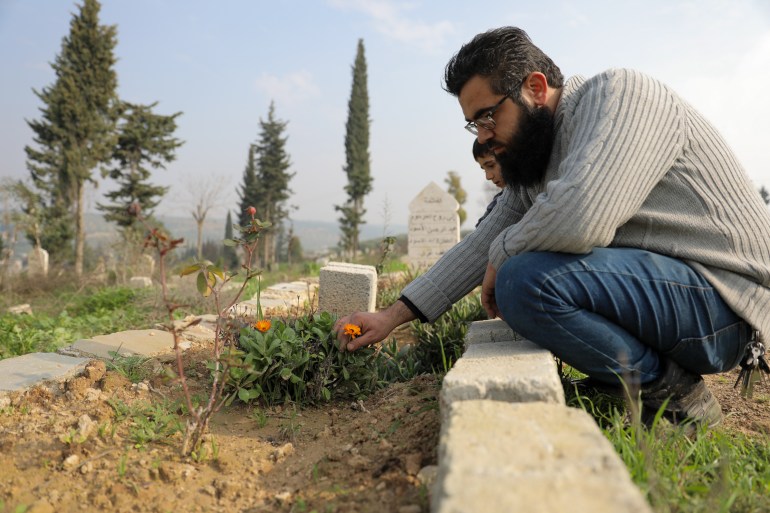
“I said I would bury my son in his grandfather’s arms.”
But the rescuers did not find grandfather and grandson, and after finding the bodies of everyone who was downstairs, they had no hope that either of them had survived.
On the second day, the villagers continued searching, gathered to console Ibrahim and tried to help the survivors.
The family’s dog Tiki stood near the rubble, barking non-stop and trying to attract the neighbours’ attention to one spot over and over again.
At first, they thought she was barking because of the aftershocks that had already begun but, eventually, Tiki’s insistent barking and attempts to dig in one spot prompted a neighbour to alert Ibrahim and focus their work there on the fourth day.
They expected that Tiki was trying to guide them to the bodies of the grandfather and grandson but to their surprise, young Hussein was alive in the arms of his grandfather, who died protecting him.
Ghazal
With all the loss Ibrahim suffered, one of the things he most wanted to recover from under the rubble was a pair of gold earrings he had bought as a gift for little Ghazal.
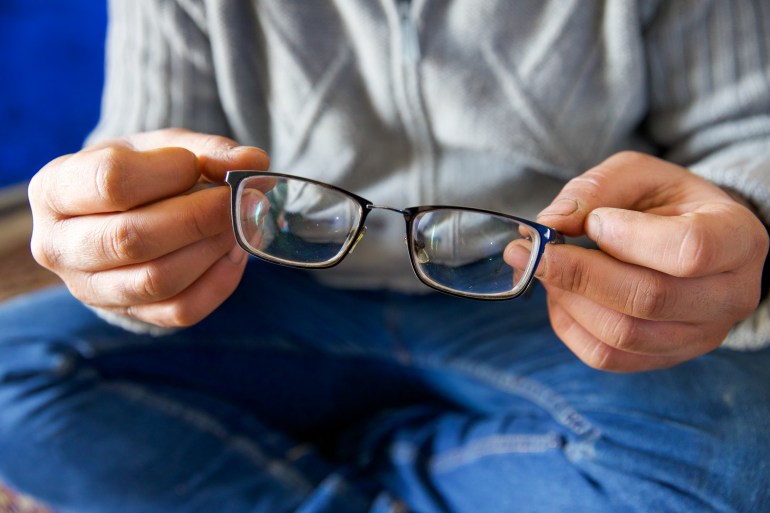
“She died before I could give them to her,” Ibrahim said, holding back tears as he explained how he had had to sell Ghazal’s earrings a while ago to raise some money, and how angry she had been with him.
“She died before she could forgive me.”
After Ibrahim’s injuries were healed, he returned to work as a day labourer, trying to adapt to his new life, and to a new routine.
Every morning, he visits his family’s graves, tells them everything that happened the day before, waters the flowers he planted near them, and reads from the Quran.
The feeling of loss is still the same for Ibrahim, and Ghazal, in particular, still accompanies his thoughts.
“I remember her every minute and second … I remember her laugh, her walk, and her actions.”
Ibrahim wanted to leave the village where he lost everything, but the graves of his loved ones prevented him.
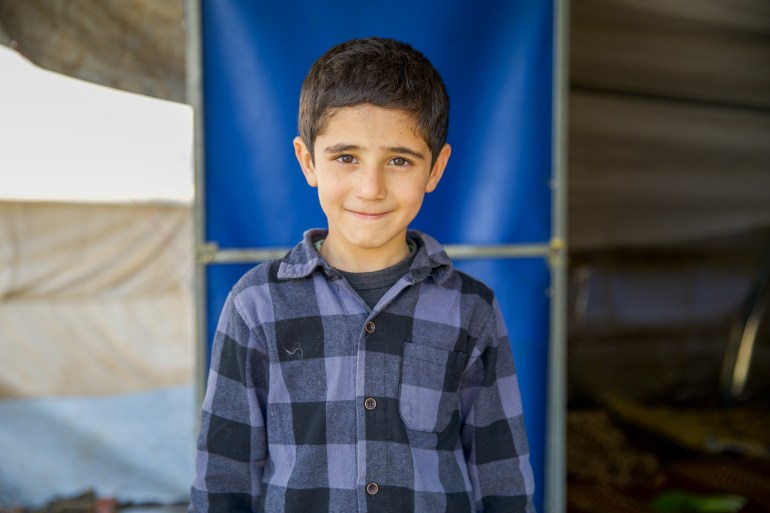
“I can’t leave my family behind.”
Today, Ibrahim resides with his wife and two children, six-year-old Hussein and four-year-old Mahmoud, and his two younger brothers. Those who are still alive give him the motivation to continue trying to recover psychologically despite his deep sadness.
“I’m afraid of losing any of them… If one of them gets sick, I can’t eat or drink until they recover,” Ibrahim said.
The effects of the shock are still evident on Ibrahim and his family, who can no longer live inside a concrete home for fear of the aftershocks.
Standing in front of the rubble of the home, which lay unchanged for a year, Ibrahim said his family were martyrs and therefore he was able to accept what happened to them.
“Many consoled me, and their words brought reassurance to my heart. They told me a hadith about the Prophet Muhammad who said that the one killed in the ruins is a martyr.
“This is what gives me patience.”
